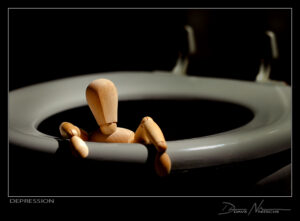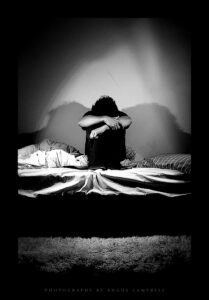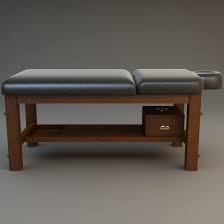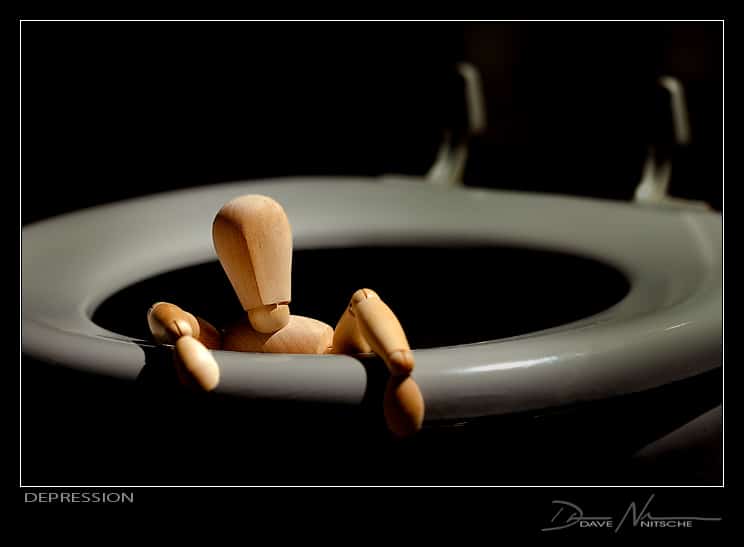One aspect of depression and anxiety that makes these disorders so frustrating is how they affect the whole body. But can depression and anxiety actually make you sick?
 No two experiences of depression are the same. But it’s pretty common to feel lethargic, fatigued, agitated, tearful, in pain, no appetite or increased appetite, and headaches, in addition to feeling down.
No two experiences of depression are the same. But it’s pretty common to feel lethargic, fatigued, agitated, tearful, in pain, no appetite or increased appetite, and headaches, in addition to feeling down.
Similarly, anxiety can show up in the body in lots of ways. Common symptoms are tightness in the chest, agitation, trembling, chest pain, nausea or abdominal distress, dizziness, tingling or cold in the extremities, panic, heart palpitations, etc.
In other words, you experience these disorders physically, as well as emotionally. You feel sick. This whole body experience can easily be misinterpreted as a physical illness, rather than a mental one.
However, sometimes depression and anxiety can actually make you sick. More precisely, they can contribute and lead to actual physical illness or another mental illness. This dynamic typically happens in two ways. First, if depression or anxiety is not treated and even becomes chronic. Second, if depression or anxiety trigger another disorder.
Getting Sick When You Don’t Treat Depression or Anxiety
 You can heal your depression and anxiety. Usual treatment involves medication, behavior changes, and psychotherapy. And if your treatment combines all these modalities, you increase your chances of treatment success. However, stigma, lack of knowledge, lack of resources, etc., keep many sufferers of these disorders away from treatment.
You can heal your depression and anxiety. Usual treatment involves medication, behavior changes, and psychotherapy. And if your treatment combines all these modalities, you increase your chances of treatment success. However, stigma, lack of knowledge, lack of resources, etc., keep many sufferers of these disorders away from treatment.
The risks untreated depression and anxiety pose make this particularly unfortunate. Make no mistake. Your put your physical health at risk by not treating your depression or anxiety. You may make yourself truly sick.
• Sleep Deprivation. Disrupted sleep commonly goes with depression and anxiety. Whether you struggle with falling asleep or staying asleep, disrupted sleep triggers a host of other problems. These include ongoing insomnia, headaches, increased stress, and impaired immunity.
• Immunity Impairment. The reason 7-9 hours of sleep nightly is important is for the restorative functions that happen during sleep. Sleep deprivation interrupts production of a variety of substances essential for immune system effectiveness. This leaves your body less able to fight off illness.
• Chronic Inflammation. Stress linked to depression and anxiety and immunity system impairment contribute to chronic inflammation. Research links inflammation to disease development, including heart disease, diabetes, and cancer.
• Heart Disease and High Blood Pressure. Research well established the connection between depression and heart disease. Increasingly, research shows that anxiety and heart disease and high blood pressure are linked, too.
• Migraine and Headaches. Anxiety, depression, and migraine can be interrelated. Anxiety, particularly, seems to increase likelihood of migraine and headache. Similarly, depression ups the probability of having headache.
• Weight Loss or Gain. Weight fluctuations are so common in depression and anxiety that it is one of the factors for diagnosis. Some people lose their appetite when depressed. Others gain weight, perhaps from craving carbohydrates that fuel serotonin production.
So If My Depression or Anxiety is Chronic, Does It Mean I’m Even More Likely To Get Sick?
 Unfortunately yes. Studies show the negative effects on your physical health increase when depression and anxiety become chronic. For example a Canadian study showed those with chronic anxiety developed stroke, aneurysm, and other cerebrovascular disease at a higher rate than the general population. Chronic anxiety also heightened incidence of heart, gastrointestinal, hypertensive, and respiratory diseases.
Unfortunately yes. Studies show the negative effects on your physical health increase when depression and anxiety become chronic. For example a Canadian study showed those with chronic anxiety developed stroke, aneurysm, and other cerebrovascular disease at a higher rate than the general population. Chronic anxiety also heightened incidence of heart, gastrointestinal, hypertensive, and respiratory diseases.
Chronic depression also co-occurs more frequently with other psychiatric disorders than episodic depression. And chronic anxiety increases the risk of physical illnesses and other mental health conditions, including depression.
So your chronic depression or anxiety are a definite risk to your health. To safeguard your health and keep depression and anxiety from making you sick, see the suggestions in the last part of this article.
Getting Sick: When Depression or Anxiety Trigger another Disorder
The second scenario where depression and anxiety can actually contribute and lead to physical illness or another illness, is when they trigger another disorder. Some of the examples of conditions possibly triggered by depression and anxiety:
Depression
Anxiety. A depressive episode or chronic depression can lead to anxiety, particularly social anxiety. Because withdrawal and isolation often accompany depression, you can begin to feel anxious at the prospect of being in social situations. This can trigger social anxiety.
Autoimmune Disorders. Depression is linked to higher incidence of autoimmune disorders in women. While depression doesn’t cause these disorders, it can trigger their onset and tends to exacerbate and flare your symptoms.
Heart Disease. Depression after a heart attack or other heart disease episode is well established, but research is increasingly showing that depression can actually trigger heart disease. The theory is that psychological distress and high levels of stress hormones cause more rapid heart rate and higher blood pressure, increasing the work of your heart. Stress hormones signal a “fight or flight” response. Then your body’s resources divert away from the type of tissue repair essential for the heart remaining in good repair.
Anxiety
Depression. If you use avoidance strategies to manage your anxiety, you’re not alone. Most people with anxiety use avoidance to keep anxiety in check. However, your world shrinks when you use avoidance as your main anxiety management tool. Eventually avoidance stops working. This can trigger depression to develop.
OCD. While anxiety does not cause Obsessive Compulsive Disorder (OCD), it can trigger it, particularly when accompanied by a particularly stressful incident or hormonal shift. This is one reason it is so important to treat existing anxiety before puberty, pregnancy, or other anticipated shifts in hormones.
Bipolar Disorder. Certain anxiety symptoms, such as insomnia, can trigger a bipolar episode in those genetically predisposed to the disorder.
Autoimmune Disorders. Disorders such as lupus, rheumatoid arthritis, and psoriasis are increasingly linked to stress disorders including anxiety. While we can’t say anxiety causes autoimmune disorders, the stress hormones associated with anxiety set the stage for these diseases to develop. Further, anxiety triggers flares in autoimmune disorders.
And as you saw in the first section above, not treating your depression or anxiety sets up a cascade of health problems that can make you increasingly sick.
So What Can I Do?
To keep depression and anxiety from making you sick, focus on these things. First, understand that depression and anxiety are whole body experiences. You feel sick because you experience symptoms with your mind and body.
 It’s also important to know that not treating your depression or anxiety sets you up to be sick with serious physical illness. Do not take that risk! Treat your depression or anxiety today by reaching out to your physician or a counselor. Remember the best outcomes involve a combination of medication, behavior changes, and psychotherapy. If you’re in the Chicago area, please contact us for help at our Glen Ellyn, Chicago (Jefferson Park), Sycamore, or Yorkville locations.
It’s also important to know that not treating your depression or anxiety sets you up to be sick with serious physical illness. Do not take that risk! Treat your depression or anxiety today by reaching out to your physician or a counselor. Remember the best outcomes involve a combination of medication, behavior changes, and psychotherapy. If you’re in the Chicago area, please contact us for help at our Glen Ellyn, Chicago (Jefferson Park), Sycamore, or Yorkville locations.
While many consider Cognitive-Behavioral Therapy (CBT) the “gold standard” for depression and anxiety treatment, you may find other types of therapy helpful or even a better fit for you. For example, many clients at Life Care Wellness have found Somatic Experiencing – especially the touch element – very helpful in shifting the nervous system dysregulation of their depression or anxiety.
Finally, consider increasing the amount of exercise you do, especially vigorous, aerobic exercise. Depression research has shown that exercise can have success rates on par with medication. Similarly, exercise has been shown to be a helpful part of anxiety treatment.
Taking these steps can help you keep depression and anxiety from truly making you sick.
Rhonda Kelloway, LCSW, SEP




